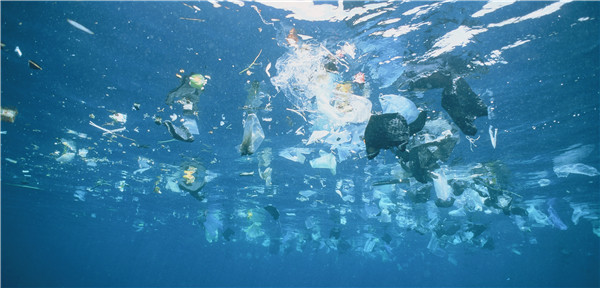The worst invention ever?

Ultra-thin plastic bags are still widely used in food markets around China. [Photo/JIN Magazine]
I have thought about this a lot lately, every time I go to the supermarket and have to buy a plastic bag, I am annoyed with myself. The reason I am annoyed is not because of the cost of the bag, which after all is minimal, but because it means that I am failing to do my bit for the environment. When I have actually remembered to bring my own and the cashier asks me at the checkout if I need one, I am so proud to be able to say, “No thanks, I have my own bag.” This shows that I am really trying to protect the planet, doesn’t it? Sadly because I forget more often than not, I end up with bags and bags of, well bags.
I was quite excited at the thought that China too had joined a worldwide initiative to save the planet by using less plastic bags. How are they faring in this regard? 2008 was a very significant year for China, there were the Olympics for one thing. Another big happening was the Wenchuan earthquake. Also that was the year that the Chinese Government made this very important Law;
The "Notice of the General Office of the State Council on Restricting the Production and Sale of Plastic Shopping Bags" clearly states: "From June 1, 2008, it is prohibited to produce, sell, and use plastic shopping bags with a thickness less than 0.025 mm nationwide; All supermarkets, shopping malls, bazaars and other retail outlets of goods shall adopt a system of paid use of plastic shopping bags, and no plastic shopping bags shall be provided free of charge”.
Ten years later
Ten years have gone by since that Law was passed so it is high time to check the current situation. Unfortunately in the past ten years the "plastic limit order" has had little effect. The National Development and Reform Commission's Department of Environmental Protection said, "Since June 1, 2008, the "plastic limit order" was officially implemented. The results have been obvious in the past seven years. The use of plastic shopping bags in supermarkets and shopping malls has generally decreased by more than two thirds, and the plastic shopping bags have been reduced by about 1.4 million tons."
Yes it may be the case that these establishments have managed to reduce the use of plastic bags but the same cannot be said of the food markets. The fruit and vegetable sellers are still issuing customers with ultra-thin plastic bags at no charge. Technology has advanced so rapidly that in the supermarket most people will pay using their mobile phone, the fact that they have to spend an extra 2/3 mao to buy a bag is not going to trouble them too much. In fact somebody pointed out that you would hardly go to the trouble of picking up 1 mao if you found it in the street, so why would anybody be too upset at having to pay a negligible amount for a bag. People seem blissfully unaware that they should be doing their bit for the environment.
Added to the problem of merchants in the markets ignoring the Law, the restaurants that deliver takeout food are also ignoring it, they also supply a huge amount of the prohibited bags. What is the Government to do? In this case there is one thing to do and that is reconsider the actual Law, so in November 2017 the National Development and Reform Commission of China decided it would be a good idea to see if an adjustment could be made which would reverse the ban. This is hardly a solution to the so called “White pollution” problem. Imagine if that principle was applied to other Laws. In fact this has already been done in some places. In England and a lot of other European countries they found that they could not stop people smoking cannabis. In order to make it look as if the Governments were still fully in control, new laws were brought in, namely if somebody had a small amount of cannabis for their own personal use, they would not be criminalised and would not in fact be doing anything illegal. It really is the thin end of the wedge. There is a very apt Chinese proverb, 上有政策,下有对策 (shàngyǒuzhèngcè, xiàyǒuduìcè), which means that the higher-ups have policies, whilst the lower-downs have ways of getting around them.
The first two years after the Law was introduced resulted in a reduction in the use of the bags, this of course greatly encouraged the Law makers and they become optimistic for the future. By 2011 however usage had once again leapt up. Although supermarkets, in accordance with the Law are charging for bags, people are still willing to buy them. Thanks to this Law they are also making a fortune as people are more than willing to pay the paltry sum of 3 mao. The bags are too cheap. When people go shopping they spend hundreds and hundreds of yuan, so a few mao on a bag is not going to be missed. If the price of the bags went up to say 1 yuan maybe people wouldn’t be so willing to buy them, it’s the principle you see.
Some of the large scale manufacturers of plastic bags in China have halted production and are facing bankruptcy but the smaller enterprises such as the take out food businesses are doing more than their fair share to contribute to the choking up of the world’s oceans, in fact they are causing more of a pollution problem than the larger companies as their bags are the thinnest and therefore more harmful. No wonder The Guardian newspaper even rated plastic bags as the "worst invention" of humans in the 20th century.
How are the other countries doing?
The British Marine Authority tell us that more than 90% of all dead marine animals have plastic in their stomachs. 10% of marine animals in the last 25 years have died on the beach because they had become entangled in plastic bags. In the ocean plastic bags take 10-20 years or more to fully degrade, so what are other countries doing about this problem? In 2007, Europe and the United States made a concerted effort to control the plague of plastic bags. I just found out recently that London was the first city in the world to restrict the free use of them. Kenya also has the strange title of being the world’s strictest opponent of bags, in 2017 they passed a Law that people who sell plastic bags may be sentenced to up to four years’ imprisonment and a fine of up to 4 million Kenyan shillings ($38,000).
In Denmark and Sweden, the average person uses only 2-3 plastic bags per year, that is absolutely fantastic and we could all learn from it. Ireland is doing a good job of raising awareness of the problem, there are even educational activities in schools. Plastic bag is a dirty word (or two) there. Unfortunately some European countries have the shameful record of using 500 bags per person per year. How about China? A report said, “Looking back at China's plastic restrictions, China has not changed”.

Plastic bags have polluted the ocean. [Photo/JIN Magazine]

Copyright © Tianjin Municipal Government.
All rights reserved. Presented by China Daily.
京ICP备13028878号-35



